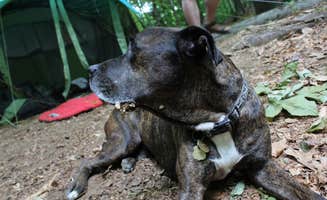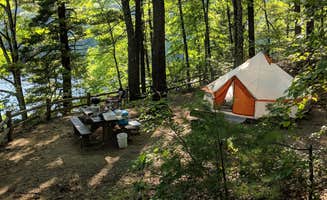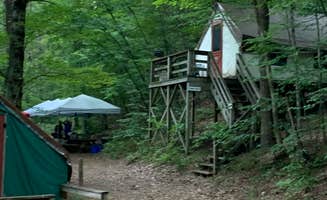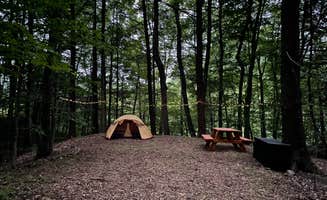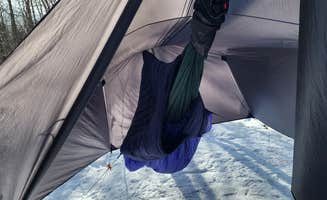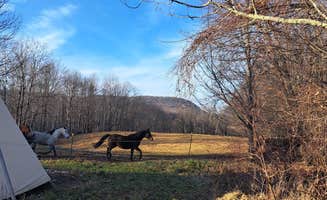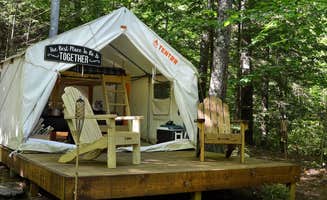Tent campsites near Vernon, Vermont occupy rolling woodland at elevations between 200-1,200 feet along the Connecticut River Valley. The transition zone between Vermont and northern Massachusetts creates a distinct microclimate where summer temperatures typically reach the mid-80s with cool nights in the 50s. Weather patterns can change quickly, with afternoon thunderstorms common in July and August.
What to do
Waterfall exploration: 15 minutes from some campgrounds. Doane's Falls near Tully Lake Recreation Area features a series of 5 waterfalls along an ascending path through a wooded area. "If you'd like to hike with children, there is an easy hike close to the entrance, along Doane's Falls. The views are beautiful, and it's not unusual to spot professional nature photographers at various points along the waterfalls," notes Nancy R.
Island paddling: Available without leaving camp. Many campers rent canoes directly from the campground office to explore Tully Lake's islands. "Canoes and kayaks are available for rental. From some of the sites, this will be a long walk during the night. The mural inside is beautiful," writes Jean C. Paddling routes range from 1-4 miles around the lake shoreline.
Wildlife viewing: Dawn and dusk prime times. The shoreline areas at Barton Cove Campground provide excellent opportunities for spotting river wildlife. "The office was super helpful when I called to make reservations, making sure to ask questions about how big my tent was, what kind of view/privacy we wanted etc so they could help me find the perfect campsite," reports Brie B. The fenced viewpoints provide safety on steep terrain.
What campers like
Quiet, vehicle-free environment: All tent sites walk-in only. The absence of cars directly at campsites creates a peaceful atmosphere across most area campgrounds. "No cars at all at the campsites, which was great for peace of mind as our toddler roamed around. It also made for a super quiet stay," shares Megan G. about her experience at Tully Lake.
Swimming access: Limited but available options. While designated swimming areas are uncommon, waterfront sites at Peace Farm Rescue and other locations permit swimming directly from camp. "There's no formal swimming area and you can't swim at the boat launches, but you are able to swim from your campsites if you so desire," explains Jean C.
Privacy between sites: Varies by location. Many campgrounds in the region design their tent sites with natural buffers. "Very lush campground, plenty of space and privacy between sites," writes Les R. about Maple Ridge Farm. Site 1 at Tully Lake gets particularly high marks for privacy, with one camper noting it was "HUGE and extremely private."
What you should know
Water transport logistics: Plan for multiple trips. Most tent campers use provided carts to transport gear from parking areas to sites. "The sites here are great, if you aren't bringing too much with you (or are staying long enough you don't mind the multiple treks to and from the car for various stretches)," advises Kris M. about Zoar Outdoor.
Bathroom distances: Central facilities only. Restrooms and showers are centralized, often located near parking areas rather than dispersed throughout tent sites. "Our site was fairly far from services, long run with small kids in the middle of the night," mentions Lauren A. about her Tully Lake experience.
Booking windows: Reserve months ahead for summer weekends. Popular sites fill quickly, especially waterfront locations. "The sites fill up weeks out (and can completely fill the day registration opens, which is date-dependent each year...Booking for Memorial Day meant I booked in April), so you have to be on your game," warns Kris M.
Tips for camping with families
Pack minimally: Cart distances matter with kids. Some sites require hauling gear nearly a mile from parking areas. "Keeping gear to a minimum is a good idea," suggests Miguel B. about his family camping experience at Tully Lake. Prioritize essentials when camping with children to minimize cart trips.
Consider weekday stays: Different atmosphere. Holiday and weekend crowds can impact the normally quiet environment. "We went memorial day weekend few years ago, busy holiday of young teens partying. Park staff tried their best, but other campers definitely took away from our stay," reports Lauren A.
Bring bug protection: Seasonal necessity. Early summer camping requires adequate insect repellent. "Buggy in June so bring your repellent," warns Sa R. about Federated Women's Club State Forest. Ticks remain active through October, requiring daily checks.
Tips from RVers
RV access limited: Primarily tent-only facilities. Most campgrounds near Vernon restrict vehicle types and access. "This is going to be more rustic as there is no driving up to the sites, but there is a main parking area and a few sites 50-100 yards away from it," notes Miguel B. about the typical setup.
Utility hookups rare: Pack accordingly. "No water or electricity at the sites," reports Sa R. from her camping experience. Self-contained units must arrive with full water tanks and charged batteries.
Cell service spotty: Download maps beforehand. "Cell coverage is pretty close to absent or poor in most of the area, so download any maps you might want (driving, trail, geocaching) before you arrive," advises Jean C. Emergency communications may require driving to higher elevation points.


